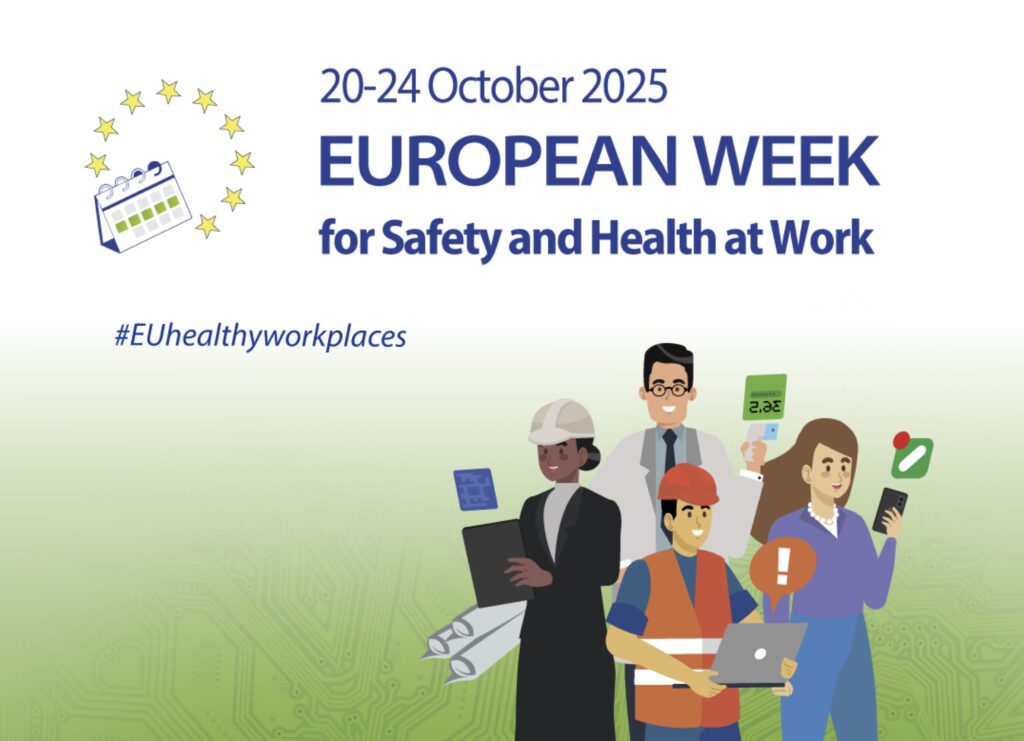European Week for Safety and Health at Work: NDPHS Bridging Knowledge and Policy in the Baltic Sea Region
Collaboration has always been at the heart of our work and also this year the NDPHS joins EU-OSHA Healthy Workplaces Campaign. Our Expert Group on Occupational Safety and Health (OSH EG) offers a strong value proposition on the subject. It provides a platform for dialogue among research institutes, universities, and government institutions engaged in knowledge development, policymaking, and implementation. It supports the exchange of expertise, aligns national experiences with regional goals, and helps integrate evidence into policy and system development.

The NDPHS acts as a unique cross-border organization working at the interface of science and policy. It helps connect evidence with decision-making and creates the conditions needed to turn shared knowledge into coordinated action. Within this framework, the OSH EG promotes the use of new knowledge by facilitating dialogue, supporting collaboration, and connecting evidence and policy while, through effective communication, reaching practice. It encourages joint learning, coordination, and shared commitment, which are essential for addressing emerging challenges in occupational safety and health.
Building on Momentum: The Mental Health Matters Project
The Mental Health Matters (MHM) project illustrates the value of the OSH Expert Group (EG) as a space for collective learning and cooperation among countries in the region. Its successful implementation and outcomes have created a strong foundation for future initiatives. The project shows that regional cooperation can strengthen institutional capacities to address mental health in the workplace, an issue that cuts across health, labour, and social policy.
Building on the progress made through the MHM project, BSR countries can turn this achievement into a sustainable policy initiative. Strengthening mental health at work is an important part of national well-being strategies that support strong economies and a key step toward implementing fundamental ILO OSH conventions.

Over ten years of participation in the work of the OSH EG have shown me how regional collaboration can drive tangible progress. Countries across the Baltic Sea region have made notable advances in OSH, including growing efforts to address psychosocial risks. The group’s collective will has a way of turning shared understanding into coordinated action. These developments reflect a shared commitment to improving working conditions and protecting workers’ well-being.
Yet building strong institutional bridges between research, policy, and practice at the national level remains a challenge for some member countries. The achievements of the OSH EG help create momentum, build trust, and offer a practical model that can inspire and inform national OSH system development and action programmes.
A Shared Platform for the Future
In shaping its future direction, the OSH EG will continue to serve as a community of collaboration, where shared knowledge and joint action drive engagement and mutual learning within the NDPHS framework. The partnership:
- Enhances capacities through dialogue, collective thinking, and exchange of experiences, building mutual trust.
- Provides access to new knowledge, including emerging OSH trends and developments.
- Fosters innovation by helping members meet the complex conditions required for collaborative research and funding.
The trust built among members enables the exchange of good practices and supports efforts to reduce capacity differences between countries and institutions, grounded in shared values and goals.
A key strength of the OSH EG lies in this shared commitment, along with its clarity of purpose and well-defined programmes of work. Working together, participating countries are better equipped to address the regional and global dimensions of health, safety, and well-being. The expertise of its members, the clarity of its role, its autonomy of action, and strong political support for international collaboration are enabling factors for the future. These assets make the OSH EG well positioned to continue advancing prevention across the region.
Looking Ahead
The OSH Expert Group plays an essential role in regional cooperation for safer and healthier work in the Baltic Sea region. Building on its achievements to date, especially the lessons of the MHM project, the group can further strengthen its contribution to evidence-informed policymaking, regional solidarity, and the implementation of international OSH standards.
Continued collaboration within the OSH EG will ensure that knowledge moves across borders, that progress is shared, and that cooperation remains a defining strength of the region’s approach to occupational safety and health.
Text: NDPHS Expert Group on OSH, Claude Loiselle, ILO